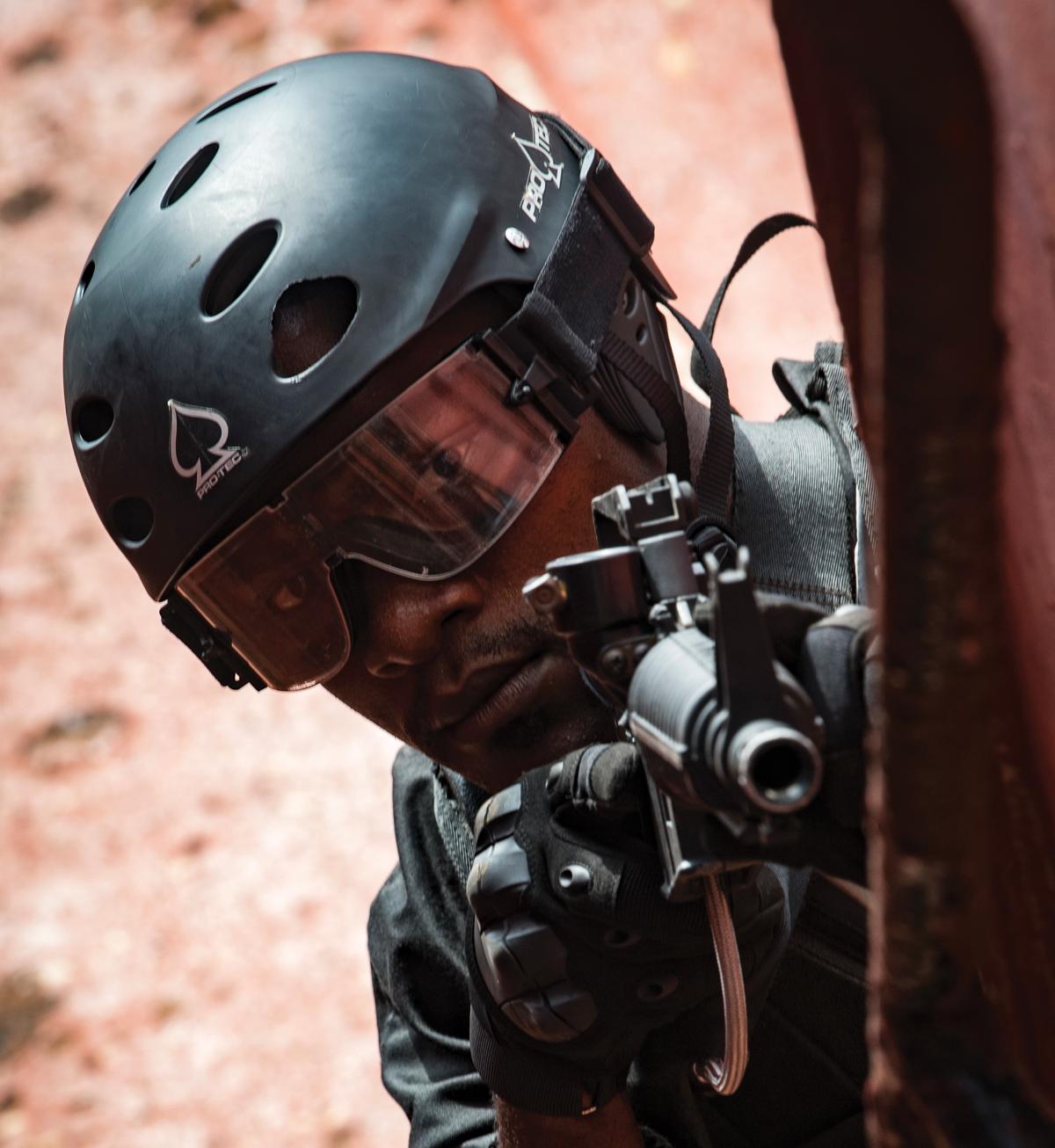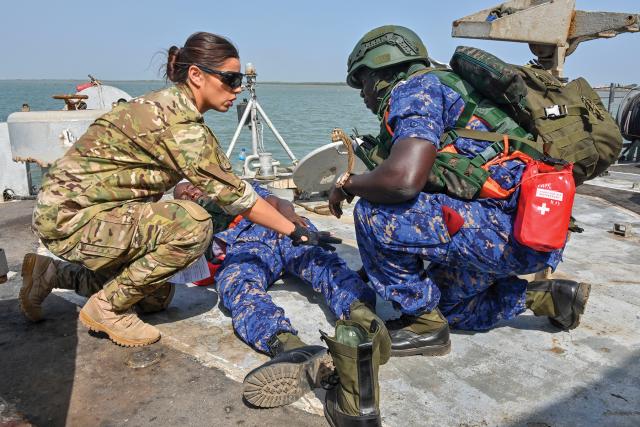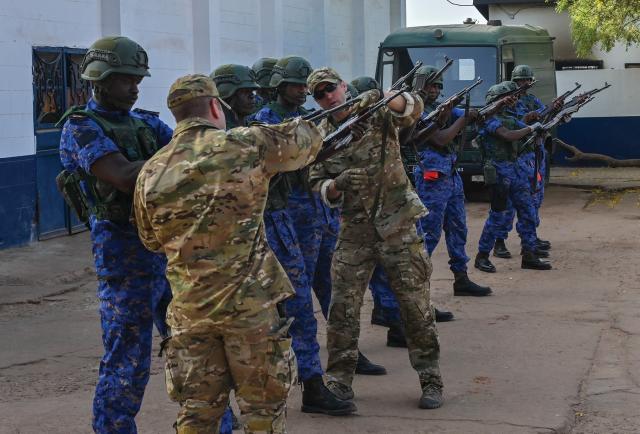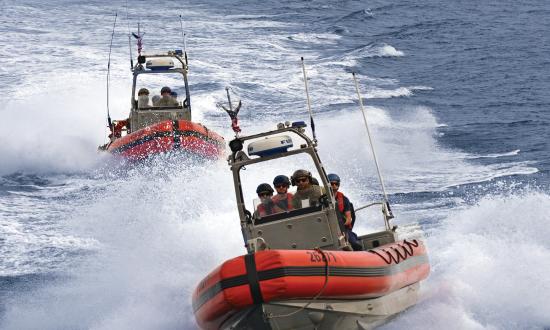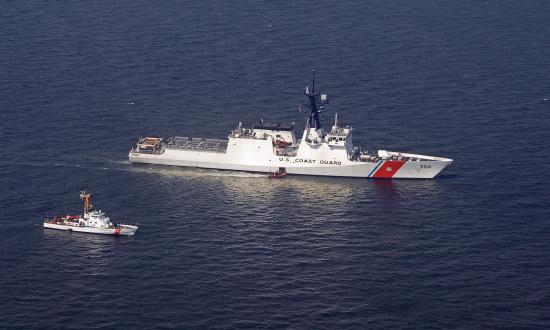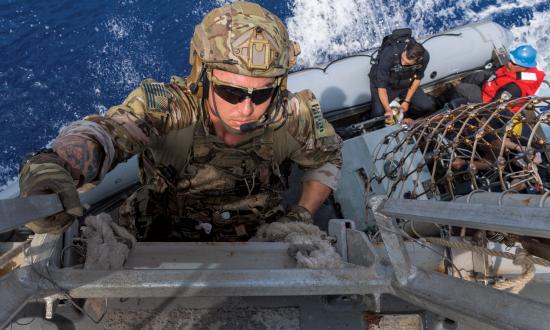Thanks to the high-profile case of the Maersk Alabama in 2009, as well as the significant media attention paid to hijackings and attacks on merchant ships in the vicinity of the Horn of Africa around the same time, modern-day piracy occupies the popular imagination in reference to a very specific place: Somalia. However, Somali piracy has receded over the past several years, and the Gulf of Guinea, on the opposite side of the African continent, has emerged as the world’s new piracy “hotspot.”1
The Gulf of Guinea encompasses 12 countries, Africa’s largest city (Lagos), other major coastal population centers, and the oil-rich Niger Delta.2 Major ports throughout the gulf are responsible for the bulk of the region’s container throughput and service the countries that make up the majority of that area’s population and gross domestic product (GDP).3 Effective counterpiracy efforts in the Gulf of Guinea are critical both for the countries of West and Central Africa and for those partner nations interested in global and regional stability more generally. The United States and its Sea Services should craft an approach for supporting local governments that applies solutions tailored to the geopolitics of the region.
Regional Counterpiracy Response
The Gulf of Guinea’s waters are the world’s most perilous for international shipping: In 2019, the number of shipping crew kidnappings there increased by 50 percent over 2018, representing more than 90 percent of global kidnappings at sea.4 Thwarted attacks go unreported at a rate that some experts peg at 50 to 60 percent, and non-kidnap cases, including forced boardings for the purpose of robbery, are often still seen.5
The majority of these attacks are launched from Nigeria by groups with base camps in and near the Niger Delta.6 With recent declines in oil prices and widespread poverty and unrest in and around the delta, such groups have shifted from capturing and selling back the liquid cargo from tankers to holding and ransoming ships’ crews.7 Some piracy groups have even established and employed mother ships that allow their small boats to attack farther offshore, challenging local forces and allowing the illicit actors to expand operations that reap anywhere from $18,000 to $500,000 per hostage.8
A bright spot in this situation is that local governments have reacted with new and appropriate measures. In addition, the United States and other partners have a history of engagement in the region and already have acknowledged the criticality of the piracy issue there.
Chief among the steps already taken is the 2013 Yaoundé Code of Conduct. This agreement, signed by 25 West and Central African nations, “contains a comprehensive regional maritime security framework to counter not only piracy and armed robbery against ships, but other illicit maritime activities as well.”9 The key components agreed to by the Code of Conduct signatories are:
- A commitment to repress piracy
- A provision for “embarked officers” of individual nations to deploy on partner-nation ships to enhance territorial jurisdictions
- An agreement to take measures to enhance communication between states
- A recognition of the importance of each nation developing specific laws and legal procedures to deal with piracy10
The Code of Conduct was accompanied by an agreement to create an Inter-Regional Coordination Centre (ICC) to “provide a means for establishing cooperation, coordination and communication between Member States . . . at the strategic level.”11 Now established and operating in Yaoundé, the ICC is coordinating among partner nations and subregional maritime security centers for both Central and West Africa.12
Promising and already effective initiatives extend beyond such international agreements and structures, as well. Nigeria, for instance, has made great strides in implementing its Deep Blue Project, an interagency, three-pronged push to overhaul and modernize the nation’s maritime security regime.13 An important milestone in the project’s execution came in August 2019, when the country opened a command center with advanced communication and monitoring capabilities for the offshore environment, designed to ensure enhanced domain awareness while serving as a hub for asset tasking, operational reports, intelligence gathering, and national and international mission coordination.14
With the command center as its “brain,” the Deep Blue Project also has been pursuing the acquisition of newer, more advanced maritime operational platforms—manned and unmanned aerial assets, maritime interceptor craft, and even armored vehicles—as well as instituting a training process for operational crews. Both efforts are nearing completion.15
The Nigerian Navy has made accompanying shifts in strategy designed to capitalize on the Deep Blue Project improvements. This notably has entailed the implementation of what Vice Admiral Ibok-Ete Ekwe Ibas, Chief of Staff of the Nigerian Navy, described as a “chokepoint concept” involving the placement of naval security stations at strategic locations to more effectively counter illicit actors.16 These measures have been complemented by legal reforms, with Nigeria passing the Suppression of Piracy and Other Maritime Offenses Act in June 2019. This landmark act made the country the first in the region to have a specific law addressing the illegality of piracy.17 The importance of such laws cannot be overstated, as all apprehensions will need to result in legal proceedings.
International Efforts
Partners from outside the region also have been contributing in the Gulf of Guinea, as they recognize the security threats outstanding in the area. For the past ten years, the U.S. military has facilitated the massive Obangame Express exercise, with the most recent iteration involving 33 nations being evaluated on almost 100 evolutions.18 The 2019 version included some 2,500 personnel, 95 ships, and 12 aircraft.19 The exercise has been especially relevant in developing counterpiracy expertise, as Obangame Express is designed to increase at-sea cooperation to counter illicit activity, with a focus on maritime domain awareness and interdiction operations.20
While such coordination may not be matched by a robust presence of nonregional foreign partner surface assets in the area, there is some effort to maintain response capability. Portugal has a “semipermanent” patrol vessel presence out of São Tomé and has patrolled and responded to cases from there.21 In addition, the EU has enacted programs to bolster maritime security in the region, including vessel presence (although these surface assets have mainly been focused on exercises and training).22 The United States likewise has committed Coast Guard and Navy assets for varying stretches of time over the past several years.23
For all this activity, though, the U.S. and nonregional partner-nation presence in the Gulf of Guinea is not comparable to that seen near the Horn of Africa at the height of the Somali piracy problem. There, a designated combined task force (CTF-151) protected a sea lane in international waters for passing merchant traffic.24 All told, some 30 nations participated with personnel and ships dedicated to the mission. Much of the interest in protecting shipping in that area, of course, stemmed from the fact that there was fairly heavy seaborne traffic passing through, either to or from the Suez Canal; in other words, the sea lanes off the coast of Somalia are some of the most important for the entire global trading system.25 The situation in the Gulf of Guinea, on the other hand, is characterized not by traffic passing, but by traffic inbound and outbound to and from multiple countries.26 Moreover, in total, Gulf of Guinea shipping activity represents a fraction of the value of the two-way traffic that occurs off the Horn of Africa.27
In addition to its lesser economic import, the situation in the Gulf of Guinea is complicated by the convergence of borders extending from the nations lying both to the east and the north of the potential patrol area.28 This requires a level of clarity, coordination, and sovereign control over territorial waters on the part of regional players that was not needed on the other side of the continent.
New Efforts Required
While there are lessons from the response to Somali piracy that can be applied to the current situation in the Gulf of Guinea, some different approaches will be required. Likewise, while many initiatives involving both regional and nonregional actors are already under way, the persistence and prominence of Gulf of Guinea piracy will require some new or redoubled efforts. Specifically, countries within the region, along with the United States and other international partners, should focus on the following:
- Refine and emphasize “embarked officer” provisions for interoperability. The Yaoundé Code of Conduct calls for and notionally empowers “embarked officers,” or ship-riders, from signatories to embark the patrol vessels of fellow signatories and exercise their state’s authority in their own territorial waters. However, the efficacy of this depends on the frequency of such embarkations (coverage would need to be near-constant to ensure usefulness and success) and the level of trust and leeway granted to the shiprider by both his own country and the host country. Yaoundé signatories should thus endeavor to ensure appropriate shiprider coverage on partner-nation patrols scheduled to operate near their borders and pursue bilateral shiprider agreements to delineate the qualifications, authorities, and limitations of participating officials.
- Develop extensive language training programs. Because of the geography and cultures of the Gulf of Guinea, language differences among neighboring countries create obstacles in coordination (English, Spanish, French, and Portuguese are all spoken).29 However, as the cooperating countries are close neighbors, they could develop reciprocal language embed programs for their maritime officers, perhaps during training, college, or early career years. By embedding up-and-coming officers in a partner-nation military structure or security agency, nations can ensure not only language skills, but also fluency in the bureaucracy and cultures of key partners.
- Exchange personnel among nations’ maritime command centers. While the ICC and subregional command centers provide excellent strategic coordination, much of the real-time enforcement and case response will be handled by individual nations’ watch floors. Personnel exchanges can harmonize efforts and enforcement standards while enhancing a regional common operating picture.
- Overhaul standards for “hot pursuit” into neighboring nations’ territorial waters. The Yaoundé Code of Conduct explicitly forbids such pursuit, even when chasing known or suspected pirates. Nations should overhaul this aspect of the code to allow hot pursuit. Standardized forms and checklists outlining case details and reasons for pursuit (from the responding vessel), and sovereign state permissions and limitations (from the nation whose territory is being entered), should be developed. These could be exchanged between ships and partner-nation approval authorities to ensure the ability to gain authorization in real time. Short of this multilateral overhaul, bilateral agreements could accomplish the same function.
- Align acquisitions of communications equipment and systems across regional partners. Incompatible systems hamper the ability of regional nation forces to communicate with each other.30 Acquisitions should be made with an eye to consistency across platforms internationally, and communications exercises should be regularly conducted.
- Set a regional standard for legal frameworks and case disposition. Individual nations should follow Nigeria’s example in passing specific antipiracy laws.31 All interdicted and apprehended individuals should be appropriately tried and sentenced if convicted, thereby ensuring justice, increasing public confidence, and providing some chance of reform. In addition, a shared regional standard for determining which country will try cases and the standards for evidence handling and contraband disposition can streamline cooperation.
- Provide stability ashore. Economic instability, corruption, insufficient prosecution, and even environmental degradation have been cited as factors that motivate individuals to engage in piracy.32 National programs to ensure effective and noncorrupt governance and justice systems will have to be emphasized, as well as broader quality-of-life initiatives that provide economic opportunities in places from which the illicit actors are currently emerging.
None of these recommendations should take attention away from the fact that the nations of the Gulf of Guinea have designed and implemented admirable measures and protocols already—even to the extent that their approach could be seen as providing a template for future counterpiracy efforts in any region. Through the Yaoundé Code of Conduct, regional command centers, investments and reforms by individual nations, international exercises, targeted external support, and other measures, Gulf of Guinea nations and their international partners have a roadmap for success. By focusing on quality multinational coordination, continuing to refine tactics and procedures, ensuring legal frameworks and processes to provide an ultimate resolution to cases, and matching at-sea efforts with landside initiatives to disincentivize piracy, they can ensure a successful resolution to their current maritime security problem.
1. “West Africa Grapples with Piracy in Gulf of Guinea Hotspot,” Hellenic Shipping News, 9 January 2020; “Best Management Practices West Africa,” Hellenic Shipping News, 6 April 2020.
2. Tola Adenubi, “Gulf of Guinea: Pirates, Sea-Robbers Attack Four Vessels In 2-Days,” Nigerian Tribune, 2 April 2020; “The Gulf of Guinea Is Now the World’s Worst Piracy Hotspot,” The Economist, 29 June 2019.
3. “West Africa Container Trade on Its Way to Maturity,” The Maritime Executive, 24 October 2018.
4. Michelle Wiese Bockman, “Mothership Identified for Gulf of Guinea Pirates,” Lloyd’s List Maritime Intelligence, 30 December 2019; Kyle Bielby, “Global Concern Grows as Gulf of Guinea Piracy Attacks Increase in Number and Violence,” Homeland Security Today, 8 February 2020.
5. “Who Will Help Solve Africa’s Piracy Problem in the Gulf of Guinea?” Deutsche Welle/DW, 14 February 2020; Adenubi, “Gulf of Guinea: Pirates, Sea-Robbers Attack Four Vessels In 2-Days.”
6. Bielby, “Global Concern Grows as Gulf of Guinea Piracy Attacks Increase in Number and Violence”; “West Africa Grapples with Piracy in Gulf of Guinea Hotspot.”
7. “West Africa Grapples with Piracy in Gulf of Guinea Hotspot.”
8. Wiese Bockman, “Mothership Identified for Gulf of Guinea Pirates.”
9. “West and Central Africa Regional Agreements and Information Sharing,” International Maritime Organization (2020).
10. “Code of Conduct Concerning the Repression of Piracy, Armed Robbery against Ships, and Illicit Maritime Activity in West and Central Africa,” International Maritime Organization, 25 June 2013.
11. “West and Central Africa Regional Agreements and Information Sharing.”
12. “YaoundО Architecture,” The Gulf of Guinea Inter-Regional Network (June 2013).
13. “World Shipping Community Confident in Nigeria’s Antipiracy Fight,” Nigeria Maritime Administration and Safety Agency, 1 March 2020.
14. Bielby, “Global Concern Grows as Gulf of Guinea Piracy Attacks Increase in Number and Violence.”
15. “World Shipping Community Confident in Nigeria’s Antipiracy Fight.”
16. VADM Ibok-Ete Ekwe Ibas, NN, “The Commanders Respond,” U.S. Naval Institute Proceedings 145, no. 3 (March 2019).
17. “World Shipping Community Confident in Nigeria’s Antipiracy Fight.”
18. MAJ Brett Walker, USA, “Ten Years of History and Lessons in West African Navy Manuevers,” DVIDS, 20 March 2019.
19. Lekan Oyekanmi and Carley Petesch, “Obangame Express Wraps Up,” Navy Times, 1 April 2019.
20. “Obangame Express,” United States Africa Command (March 2019).
21. Tola Adenubi, “Pirates Attack, Shoots Vessel in Nigerian Waters,” Nigerian Tribune, 27 March 2020; “Portuguese Navy Ships Hunt Pirates in Gulf of Guinea,” The Portugal News, 10 November 2019.
22. “EU Maritime Security Factsheet: The Gulf of Guinea,” European Union External Action, 29 October 2019; “The French Navy Stands with Her Partners in the Gulf of Guinea,” MinistПre des ArmОes of the French Republic, 6 January 2016.
23. Johanna Loock, “U.S. Navy Sends Second Ship to Gulf of Guinea in Response to Security Needs,” Maritime Security Review, 9 July 2019.
24. “U.S. to Lead New Anti-pirate Force,” BBC News, 8 January 20019.
25. “Who Will Help Solve Africa’s Piracy Problem in the Gulf of Guinea?”
26. “Who Will Help Solve Africa’s Piracy Problem in the Gulf of Guinea?”
27. Wiese Bockman, “Mothership Identified for Gulf of Guinea Pirates.”
28. “Who Will Help Solve Africa’s Piracy Problem in the Gulf of Guinea?”
29. Oyekanmi and Petesch, “Obangame Express Wraps Up.”
30. “Piracy in Gulf of Guinea: Significant Drop in the Gulf of Guinea Imminent,” Hellenic Shipping News, 9 January 2020.
31. “Piracy in Gulf of Guinea: Significant Drop in the Gulf of Guinea Imminent.”
32. “Who Will Help Solve Africa’s Piracy Problem in the Gulf of Guinea?”



